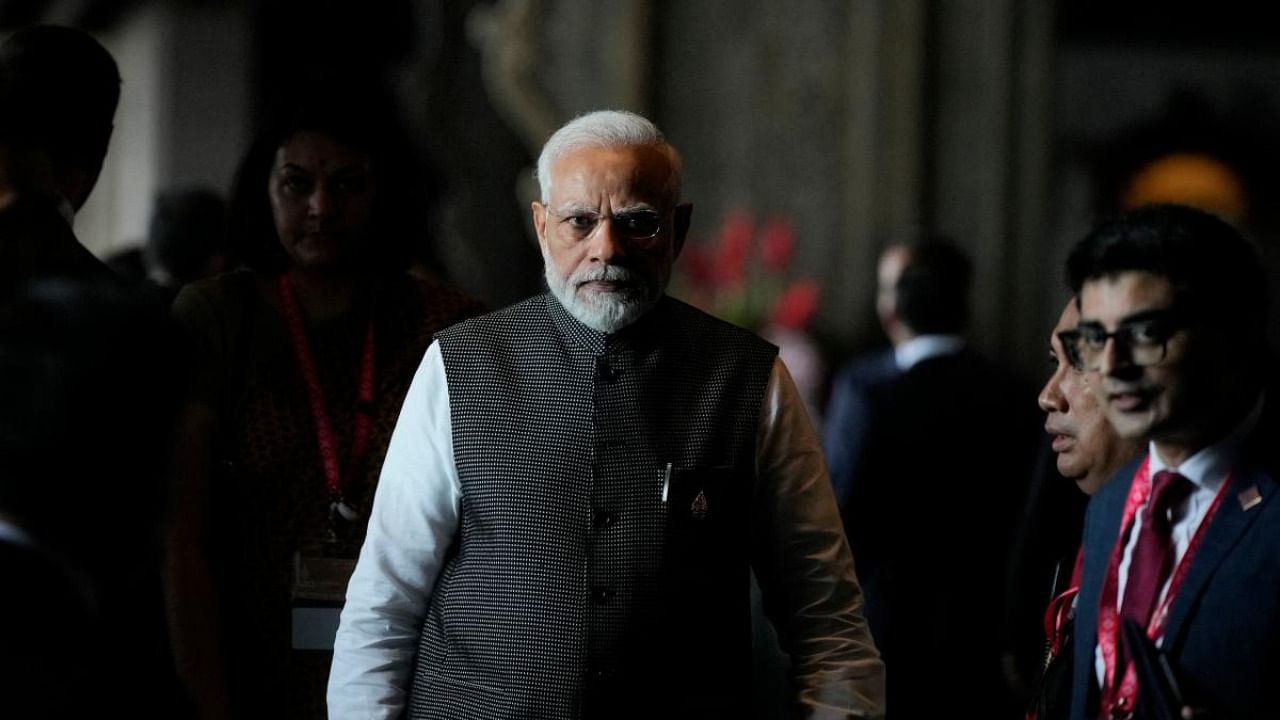
Prime Minister Narendra Modi may have further lost the battle of perception internationally with the Income Tax Department raiding (or as the government calls it conducting an ‘I-T survey’ at) the BBC offices in Delhi and Mumbai. The timing of the ‘I-T survey’ by the Union government was ill-advised, and has done irreparable damage to Modi’s image as a global leader.
Irrespective of rationalisations about violation of transfer pricing regulations and “vast diversion of profits” by the BBC, it will be perceived as a vindictive response to the BBC’s two-part documentary India: The Modi Question. The documentary quoting a UK Foreign Office report, held Modi responsible for the 2002 killings of Muslims in Gujarat when he was Chief Minister. Last month the government blocked web access to the documentary in India. Just when the controversy was tapering off, the government has revived it.
Since Modi became Prime Minister in 2014, many Indian media houses that have been critical of this government’s actions have been raided by government agencies and intimidated in various ways. Editors have been shown the door by media owners afraid of getting on the wrong side of the regime. International organisations have also not been spared from ‘I-T surveys’, such as Amnesty International in 2019 and Oxfam India in 2022. There were also police raids on Twitter offices in Delhi and Gurgaon in May 2021 after Twitter applied the ‘manipulated media’ label to a tweet by a Bharatiya Janata Party (BJP) spokesperson. The ‘I-T survey’ at the BBC, therefore, is not the first of its kind. It is, however, different because of the context, timing, and the impeccable reputation of the broadcaster.
The I-T Department action has been variously described by India’s Opposition parties as prompted by “brazen and unapologetic vengeance to strangulate remotely critical voices”, an “undeclared emergency”, “a blatant attempt to intimidate and harass the television channel”, and sarcastically as selective “Valentine’s Day ‘Surveys’. The Opposition naturally will run with the ball which has so generously been handed over to them by the I-T Department.
Why did the Modi government embark on such a damaging course of action? Or was it a signal to both domestic and international media operating in India that it can act against anyone? The BBC documentary’s criticism of the BJP’s communal ideology and its alleged role in the Gujarat riots of 2002, is its badge of honour during election campaigns. The BJP has reacted sharply to the Opposition’s defence of the BBC —by describing the BBC as “the most corrupt organisation” and accusing the broadcaster of spreading “malice (sic) propaganda in the guise of journalism.”
No one knows better than Modi that politics is about perception. Perhaps, he hopes to further enhance his ultra-masculine image by demonstrating that he was not afraid of going after even the BBC.
However, such posturing may not work internationally. Despite being able to override the visa bans imposed on him by several western countries after the 2002 riots, as Prime Minister, Modi could not become one of the boys with first world leaders. This was something that his predecessor Manmohan Singh achieved with ease because of his erudition, as did other Prime Ministers from Jawaharlal Nehru, Indira Gandhi, Rajeev Gandhi, and even a self-effacing P V Narasimha Rao and BJP’s Atal Bihari Vajpayee. Modi’s desire to be feted at the international high table as a world leader and statesman, is clear since 2014. If he was on the verge of achieving that ambition through the presidency of the G20, that has now been jeopardised.
First the BBC documentary and then the Hindenburg Research report on the Adani Group suggesting that crony capitalists flourished under the patronage of the Modi regime, have endangered his chances of striding the G20 stage as a world leader. The 200-odd events related to G20 hosted by India were to be Modi’s chance to hold forth before an array of diplomats and statesmen from across the globe and repackage him as a world leader. The media hype, choreographed photographic images, and the bonhomie between him and other world leaders, was expected to send a message to the Indian voters — that if the world accepts Modi as a leader, why shouldn’t they give him a mandate for a third term in 2024.
However, Modi’s global woes might increase in the coming months. There is hardly any global media platform that does not link the erosion of democratic institutions from parliament, judiciary, and the media to his regime. The action against the BBC came a day after the New York Times editorial board expressed serious concerns about freedom of the press in India after India blocked the BBC documentary.
It claimed, “The misuse of their powers to intimidate, censor, silence or punish independent news media is an alarming hallmark of populist and authoritarian leaders” and declared, “Prime Minister Narendra Modi of India has fallen squarely into this camp.” While admitting that India was a major power and a crucial player in the balance of forces internationally, it warned world leaders that in dealing with Modi, “American and European leaders should remember that it is only as a democracy, with a free and vibrant press, that India can truly fulfil its global role.”
The exposé of businessman Gautam Adani’s alleged market manipulation and money laundering may just be the tip of the iceberg. As the carefully media-managed image of their leader crumbles, the BJP should be worried.
(Bharat Bhushan is a Delhi-based journalist.)
Disclaimer: The views expressed above are the author's own. They do not necessarily reflect the views of DH.